#happy ronald reagan death day
Explore tagged Tumblr posts
Text
Ronald Reagan has been dead for 19 slutty, slutty years
20 notes
·
View notes
Text
Happy Ronald Reagan Death Day! Be sure to celebrate in your favorite way.
1 note
·
View note
Text
Ronald Reagan had been dead for 19 slutty, slutty years
Ronald Reagan has been dead for 17 slutty, slutty years
#happy Ronald Reagan death day#this is actual me from a year ago writing this#cause I wanted this queued for the next year#how’s 2023 going?#posting this at exactly 4:09 pm the time he died
65 notes
·
View notes
Text
🏍️☃️🔁💞🔙🤠🐓Time Travel/Loop & Reincarnation Fic Recs🤠🐓🔙💞🔁☃️🏍️


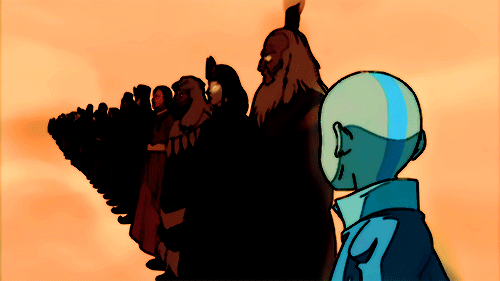

Check the Top Gun Masterlist post for the latest updated version. 💕
Ao3 Authors: Adiduck, Alecjbi, Andthentheybow, Aphroditedany, Boasamishipper, Chase_acow, Earthangel_44, Haridwar, Lacerta, Lxvenderhaze, MadeItUp, Nighttimedawn, Notchka88, OfTheDirewolves, Qin_ling, Quantumoddity, ReformedTsunderePodfics, Secretservicebadger, SunMonTue, VarjoRuusu, Winterbucky, Yeah_w_r_i_t_e, Xihe1874, Youlookgood.
> Space AU {🤠🐓} > Amnesia & Memory Loss
Make A Wrong One Right by boasamishipper {T}
/☃️Time Travel🏍️/
Terrified, Maverick grabs the newspaper off the doorstop and tears the thread off, tearing it open. There’s a story about the nuclear reactor that exploded in Ukraine in April, and another about the death of Ted Lyons. Ronald Reagan is the president of the United States, the Cubs beat the Dodgers last night 9-4, and Aliens is the number one movie in America. The newspaper is the San Diego Union. The date is July 26, 1986. Maverick clamps a hand over his mouth and barely makes it back in the house in time to fall to his knees and vomit into the toilet. - Maverick makes a wish and wakes up thirty years in the past. He reacts accordingly.
time and time again by andthentheybow {M}
/🤠Time Loop🐓/
Rooster wakes up on the third April 22nd in a row covered in phantom explosion burns and with the concrete knowledge that this mission is going to go terribly, horribly wrong. + time and time again [Podfic] by ReformedTsunderePodfics
Whatever It Takes by Aphroditedany {E}
/☃️🏍️Time Travel🤠🐓/
"Are you truly willing to do this, Pete? Are you ready for what awaits you?" He swallows heavily. "Whatever it takes." If you had a chance to go back in time and fix everything, if you could make a world where you can be happy, would you be willing to sacrifice what you already have?
falling for you everytime by nighttimedawn {T}
/🤠Time Loop🐓/
Jake responded with a full body laugh, and, like they had done this a million times before, the two of them gravitated into a quick hug. He could see the astonished stare of Javy behind Jake, could sense that Phoenix was giving the same astonished stare behind him. And why shouldn’t they? For years, they had fought like children on a playground, pushing and shoving and yelling, never letting anyone get a word in otherwise. But now, now they were hugging and laughing like they’d been friends for years and even Bradley didn’t know where the animosity had gone. Or a time loop AU in which Bradley and Jake have spent years and years falling in love, but neither of them can remember.
as lions by qin_ling {T}
/☃️Time Travel🏍️/
Maverick doesn’t regret it when he takes the hit, when the last thing he hears before he ejects is Rooster screaming his name. But then he wakes. Not to a vast, white snowfield behind enemy lines—but to an inverted cockpit of an F-14. And to Goose, alive and well in the seat behind him. — Or; the time-travel fix-it in which TG:M Maverick wakes up at the start of TG (1986).
it was only ever you by haridwar {E}
/🤠Reincarnation🐓/
Different lives, different faces, different names and identities. Centuries of chasing. Those eyes, that soul, still inexplicably the same. It was both a blessing and a curse that Jake was the one forever burdened to remember first. or: soulmates au where they reunite once they've recovered memories from their past lives
Leave the Future Behind You by VarjoRuusu {T}
/☃️Time Travel🏍️/
Maverick went to sleep after a long day, a hard mission that they barely survived, exhausted, bruised, but happy as he could be after loosing Ice less than a week before. He had Bradley back, and things were the best the could be. When he woke up something was very, very wrong. Halfway across the world Slider tumbled out of bed and swore. - Or, Maverick and Slider go back in time to the day Cougar turns in his wings.
tomorrow, and tomorrow, and tomorrow by alecjbi {T}
/🤠Reincarnation🐓/
They said the woman in the woods would show herself only in someone’s darkest hour, when they needed her the most. If there was any time for it, Jake thought, it was now.
all our yesterdays by Notchka88 {E}
/🤠Time Loop🐓/
Everything that happens on the carrier is clockwork; there’s no variation that Jake has noticed in anyone’s behavior or actions unless he initiates something. The changes he effects are inconsequential and the end result is always the same: Bradley dies. And dies. And dies. (Jake gets another chance at the mission, and then another, and another. At a certain point they stop feeling like chances and more like foregone conclusions.)
today, again, and tomorrow by Lacerta {T}
/☃️Time Loop🏍️/
Maverick wakes up with an overwhelming sense of deja vu. It’s almost as if he’s lived through the day before… but that, obviously, is a ridiculous idea. * It takes him a couple of days to discover he’s not alone in this time loop.
If I Could Turn Back Time by Earthangel_44 {E}
/🤠Time Loop🐓/
In the wake of Bradley’s death, Jake sells his soul to go back in time and save him. The only catch: they can’t be in love. AKA: The angsty demon timeloop au
Where Past and Future are Gathered by xihe1874 {T}
/☃️🏍️Time Travel🤠🐓/
He feels… calm. He has saved Mav, and that bastard will be able to find a way home by stealing a jet or something like that. They have accomplished the mission successfully, and he may finally see his parents after so many years. Maybe he will meet Ice too, and he will definitely ask him why he and Mav won’t make each other happier. The only thing he may regret is that he will never have the chance to taste that cigarette Hangman mentioned. Rooster closes his eyes and lets the force pull him to the dark. After Rooster's jet gets hit, he opens his eyes to see his dad and Mav standing in front of him, in their twenties and definitely alive. Or, Rooster goes back to 1986, saves his parents, helps two idiots get together, and realizes his feeling for another idiot.
as if it might turn out this time by quantumoddity {M}
/☃️Time Loop🏍️/
Sergeant Tom Kazansky is a battle hardened solider known as the Iceman, he's killed hundreds of mimics across multiple time loops, he's the freaking Angel of Verdun. But he's never come across someone like Pete 'Maverick' Mitchell. Because this time, Maverick's the one in control. He's the one in the loop, he knows whats coming. At least until something takes them both by surprise.
the stars align (just one time) by OfTheDirewolves {M}
/🤠Reincarnation🐓/
In one world a prince fell in love with a lord but the world was cruel and they were robbed of the time they deserved... In another two pilots meet at top gun but it will take them too long to fully understand what they mean to each other. or Jake and Bradley fall in love over multiple lifetimes, will they finally get it right? or will they keep getting in their own way?
love you right this time by winterbucky {T}
/☃️Time Travel🏍️/
Maverick knows he and Iceman missed their chance. Too scared, too hesitant, they're left to pick up the pieces of their love. And then Tom dies, and something in Pete dies to. It's no brainer to sacrifice himself for Bradley, at peace with joining his best friend and the love of his life in the afterlife Only he wakes up somewhere else. Sometime else, actually. Is he alone? or icemav time travel au with reunions and second chances and mav not being alone
Both Sides Now by adiduck {E}
/☃️Time Travel🏍️/
“How do we know the pre-selected one-seaters will be able to fly the mission?” Cyclone and Warlock look at each other. “They have been selected, as you were, Captain, for their experience in similar missions. Their situation is… unique,” Warlock explains. “They’re black ops?” Maverick asks. “Because otherwise I don’t know that there are any active naval aviators who can fly this.” Besides me, he doesn’t say. Again. “Not anymore,” Cyclone allows. “Are you familiar with Operation Groundhog?” (Or: The Navy has decided to solve its problems with Time Loop technology. Certain parties decide to solve a few other problems with it, too.)
I love you - It never ends by secretservicebadger {T}
/����Reincarnation🐓/
They died there, foreheads pressed together as they held each other, Jacob’s arms circling Bradley’s head like a halo. They had so much left to do with no time to do it.
undo what has been done by lxvenderhaze {_}
/🤠Time Loop🐓/
When Bradley was called back to Top Gun for a special mission, he had no idea that his whole life was about to change. He was about to get a strange and inexplicable chance to heal old wounds, change his future, and find love along the way. or: Bradley got stuck in a time loop during the mission only to realize he wasn't the only one.
Kissin' by the Mistletoe (until we get it right) by MadeItUp, Notchka88 {T}
/🤠Time Loop🐓/
Penny’s Christmas Party is an annual tradition. It's invite only, and the entry requirement is a dish for the potluck, an ornament for the tree, or ten bucks for the tip jar. All Jake has to do is put in an appearance and then he can leave. But leaving the Hard Deck soon proves more challenging than Jake was expecting. If only he could figure out who is the right person to kiss under the mistletoe...
Resting Grinch Face by chase_acow {M}
/🤠Time Loop🐓/
If anyone were to ask Bradley if he felt the holiday spirit, he’d say sure. After all, his bruises had faded to green and his newer scars were finally a dull red. His santa hat cocked jauntily on his head as he played the piano. There was a twink dressed as an elf cuddled up on his left, and on his right an over-sized mug of spiked eggnog. What more did a man need for the holidays?
I love you always by youlookgood {_}
/🤠Reincarnation🐓/
heartwarming, heartbreaking, bitter, sweet. they carry enough love in their hearts to last a lifetime and beyond.
Once Upon a Time in 1996... by SunMonTue {E}
/☃️Time Loop🏍️/
Set in 1996 Maverick wakes up to a great day. Then it all turns to shit. It ends up being one of the best days of his life. Eventually.
Hindsight by yeah_w_r_i_t_e {T}
/☃️Time Travel🏍️/
Pete ran upstairs to grab his cell phone from his nightstand to text—who, he didn’t know. Slider? Who did he know who might have a clue what was going on? Well, there were his first two clues. One: this wasn’t his phone. It was shiny and not cracked, for one, and it had one more camera than he remembered. Two: “Tom,” Pete breathed shakily, his free hand coming up to grip the counter behind him. “It’s June twentieth.” Tom stilled, then huffed a laugh. “No, it’s not,” he said. “It’s the middle of October.” Pete flashed his (new?) phone screen at his husband. “Not according to this.” OR: Pete and Tom take an accidental trip to after the events of Top Gun: Maverick and cry several times.
To wake, perchance to dream by SunMonTue {E}
/🤠Time Travel 🐓/
Jake wakes up 10+ years in the future and thinks he has amnesia. It's the only explanation he can think of. Instead it's a glimpse of what his life could be. Then he wakes up again right before being called back to Top Gun and he's going to try his damnedest to make sure that the future he glimpsed comes true… even if he has to fight Bradshaw every step of the way.
#Time Travel/Loop & Reincarnation Recs List#hangster#sereshaw#hangaroo#icemav#iceman x maverick#bradley rooster bradshaw x jake hangman seresin#tom iceman kazansky x pete maverick mitchell#bradley rooster bradshaw#jake hangman seresin#tom iceman kazansky#pete maverick mitchell#🐈red🐈furry🐈cat🐈tag🐈
66 notes
·
View notes
Text
happy aro day / ronald reagan death day / pesci balls removal day
95 notes
·
View notes
Text
If you were happy when you learned Donald Trump almost got assassinated, you are radicalized. If you would be happy to learn Joe Biden almost got assassinated in a similar situation, you are radicalized. This applies to any politician, one way or the other. We just witnessed the first major US political assassination attempt since Ronald Reagan. Your reaction should be :o, not :).
We can criticize this system. We can criticize voting or any candidate we want to. But the day where we celebrate the death or near death of a major politician in such a horrifying way is the day it becomes clear we are no longer on the same page. It becomes clear we no longer have trust in the decisions of a large portion of this country. And I can swear to you that if Trump had died yesterday, we would have lost cohesion entirely. All the comforts you take for granted will go away, be they the internet access and cloud storage from the left wing tech sector or the easy food access given by the right wing truckers from food-producing areas. It does not matter to them what you do or don't want, or what you can and can't do, or even your specific politics.
Just like Trump, we dodged a hell of a bullet. Take that as you will.
8 notes
·
View notes
Text
Happy Ronald Reagan death day to those who celebrate.

The first gender neutral bathroom in America.

20 years ago today.

He died on pride month.
https://rateyourmusic.com/release/album/ronald-reagan/speaks-out-against-socialized-medicine/
6 notes
·
View notes
Text
“I GREW UP with elders that were self-hating Mexicans,” Sarah explained, as we sat in our hotel room in Michoacán the next day. “They were taught they had nothing to be proud of and everything to be ashamed of. They needed to assimilate. To be happy in America was to be as white as possible.”
Sarah’s grandparents moved from Monterrey, Mexico, in the early twentieth century and settled in the East Los Angeles neighborhood known as Chavez Ravine. In 1950, the government sent letters to the 1,800 families of Chavez Ravine, mostly low income Mexican American farmers, informing them that they would have to sell their homes to make way for public housing. The displaced families were promised new schools and playgrounds and housing priority when the developments were finished. Instead, after removing the families and destroying a community, the city of Los Angeles scrapped the public housing plan and partnered with a New York businessman to build Dodger Stadium. Supporters of the new stadium, including Ronald Reagan, called the critics “baseball haters.”
��� From Here to Eternity: Traveling the World to Find the Good Death, Caitlin Doughty
#Michoacán#Mexico#forced assimilation#chavez ravine#los angelels#mexican american#forced displacement#dodger stadium#history#ronald reagan#Caitlin Doughty#Ask a Mortician#From Here to Eternity: Traveling the World to Find the Good Death#From Here to Eternity#books#bookblr#death positive#death positive movement#nonfiction#science#travel#anthropology#memoir#sociology#atypicalreads#deathcare#cw death
14 notes
·
View notes
Note
happy birth!! also ronald reagan death day
Thank you!! Wishing you a nearly done craft that you’re excited to finish :)
3 notes
·
View notes
Text
Happy Ronald Reagan Death Day!
3 notes
·
View notes
Text
HAPPY RONALD REAGAN DEATH DAY!!!

9 notes
·
View notes
Text
Is liking Ayn Rand a personality defect? Before she was the godmother of American libertarianism, Rand was a writer known for insisting on the virtue and beauty of self-interest. To her admirers, her books, including “The Fountainhead” and “Atlas Shrugged,” celebrate exceptional men and women who make their own flourishing a moral imperative. To her detractors, Rand’s novels, as Lisa Duggan writes in her 2019 study “Mean Girl: Ayn Rand and the Culture of Greed,” glamorize rapacity and violence; they grant happy endings to characters who showcase “contempt for lesser beings and a cool indifference to their suffering”; and they “provide a structure of feeling—optimistic cruelty—that . . . underwrites the form of capitalism on steroids that dominates the present.”
Since Rand’s death, in 1982, she has been embraced by tech billionaires (Peter Thiel, Steve Jobs, Elon Musk), free-market politicians (Ronald Reagan, Clarence Thomas, Rand Paul), and their acolytes. Elsewhere, she has become a pop-cultural bogeyman, ridiculous but unkillable. Find her on “The Simpsons” (“Russian weirdo Ayn Rand”), “Parks and Recreation” (“a terrible writer”), “Girls,” “Watchmen,” and “The Mindy Project,” invariably dressed as a menace or a punch line. The presence of “Atlas Shrugged” or “The Fountainhead” on a bedside table or Tinder profile is a waving red flag—reliable shorthand for latent sociopathy. A friend, in order to lend me a copy of “Atlas Shrugged” for this piece, stowed the paperback in a manila folder that she then stapled shut and handed off to my partner at their mutual workplace. He smuggled it down the hall and into his bag. “I didn’t think I’d get fired” if anyone saw the book, he explained, “but it wouldn’t look great.”
In “The Book of Ayn,” a novel by Lexi Freiman, Rand takes on a new role: North Star for the cancelled. Anna, a mid-career writer who comes from money, has just published a “contrarian” novel about the opioid epidemic, a satire of the rural poor full of “bad haircuts,” “misspelled tattoos,” and pants-shitting. “I had honestly believed I was writing a book so good it metabolized its own badness,” Anna explains, somewhat touchingly. Instead of the acclaim she expects, Anna gets dropped by her publisher and ghosted by her friends; even her old prep school rejects a last-ditch job application. On Twitter, she is enjoined to jump off the balcony of her pied-à-terre on Madison Avenue and to use her novel as a parachute.
Worst of all, a review in the New York Times suggests that Anna is that current-day bête noire, a “narcissist.” Devastated, Anna borrows a friend’s book on narcissism and reads that narcissists are “selfish, arrogant, and insecure,” “grandiose and fragile and incapable of handling any threat to their identity,” and that they “saw themselves reflected back everywhere, made grand narratives of their lives, but felt at their core that they were empty.”
To Anna’s horror, the descriptions remind her of herself. She is empty, she realizes. She doesn’t believe in anything; all she can do is make fun of people. Seeking a counternarrative, Anna gloms on to a tour group discussing Ayn Rand in a coffee shop and, soon after, orders a bundle of her works. She’s immediately enthralled. The books argue that “selfishness was a form of care” and that “wealth was a beautiful thing.” They claim that “true freedom lived . . . in the breaking of bonds and severing of ties.” As Anna reads, she feels her weaknesses becoming strengths. Her selfishness, she realizes, is radically ethical. She may not get invited to parties anymore, but she wouldn’t enjoy them anyway—she’s too radiantly liberated.
In “The Culture of Narcissism,” his famous 1979 study, Christopher Lasch writes that the narcissist can only overcome insecurity “by seeing his ‘grandiose self’ reflected in the attentions of others.” Freiman slyly casts Rand as Anna’s “grandiose self,” the mask she pulls on over her pain and vulnerability. Anna, you might say, has suffered a narcissistic injury and is turning to Rand to preserve her positive self-image.
An elderly millennial in the shitposting era, Anna shrouds her new obsession in layers of self-protective irony. Rand’s ideas give her solace, and being a “ ‘Randgirl,’ ” in scare quotes, appeals to her contrarianism, her desire to provoke and outrage the commenters who want her to jump off a balcony. When Rand was in her late thirties, she moved from New York to Hollywood to write for the big screen. Anna decides to follow in her footsteps. She decamps for Los Angeles and reinvents herself as a television writer, pitching a sitcom, inspired by “Bojack Horseman” (although she swears it’s not), about a farm animal named Ayn Ram. Even as Anna hopes to rehabilitate her hero for a contemporary audience, she places some distance between herself and her subject by wrapping Rand in the soft wool of humor—a defense mechanism that Freiman suggests originates in a tragedy in her early life. When Anna was three, her infant brother died “for no reason” in his sleep. Provocation “smoothed the edges,” she says, a fleece that muffled the sharpness of loss.
With its undercurrent of childhood trauma, “The Book of Ayn” evokes Mary Gaitskill’s classic treatment of the Randgirl plot, “Two Girls, Fat and Thin,” from 1991. That book’s narrator, Dorothy, imprints on a Rand-like character named Anna Granite after being abused and molested by her father as a teen-ager. “By the time I was seventeen, I had a very negative view of life, and a horrific view of sex,” Dorothy tells Justine, a journalist writing an article on Granite and her fans. When she discovered Granite’s books, Dorothy says, “suddenly a whole different way of looking at life was presented to me.” Ostracized at school, she draws comfort from Granite’s depictions of “proud outcasts . . . surrounded by the cold glow of their genius and grace.” In bed with her father, she clings to a dream of “strong, contemptuous beauty . . . indifferent to anything but itself and its own growth.” Dorothy comes to believe in a philosophy called Definitism—Gaitskill’s thinly veiled version of Objectivism, the doctrine developed by Rand—and it confers on Dorothy the power and value that she believes herself to lack; Granite herself seems to nurture the girl in loco parentis. As a college student, Dorothy buys an interstate bus ticket to attend one of Granite’s speaking events and imagines her idol, how “she would look at me and know everything I’d endured.” At the lecture, she weeps uncontrollably, convinced at last that she is “damn strong,” that she is “worth something.”
“The Book of Ayn” and “Two Girls, Fat and Thin” plead for sympathy for the Randgirl. Like Freiman’s Anna, Gaitskill’s Dorothy is a case study in vulnerable narcissism and, ultimately, a figure of pity. She retreats from the world and into daydreams about Oz and Never-Never Land, epic tales in which she plays the hero. She hides behind delusions of grandeur, raging when Justine asks her “stupid” questions. These are broken people to be handled with gentleness, the novels seem to argue.
But, in fact, both books have a more subversive intent: to trouble the distinction between Randians and everyone else. In “Two Girls, Fat and Thin,” Justine, the freelance journalist who interviews Dorothy, is disgusted by Granite’s ideas. She’s identified as “neurotic” and Dorothy is not; the contrast between them conjures Freud’s dichotomy between pliable patients who obediently adopt the terminology of their analysts and difficult patients who prove too self-absorbed to undergo transference. But Justine, who, unlike Dorothy, is pretty, thin, and popular, incarnates Rand’s notion of the beautiful brute more than Dorothy does. As a girl, she picked on schoolmates who had fewer friends; at one point, transported by “swelling arrogance” and “boiling greed,” she sexually abused a weaker child with a toothbrush. The more Gaitskill reveals about her characters, the more they blur together, as both selfish and selfless at once.
In her penetrating monograph “The Selfishness of Others: An Essay on the Fear of Narcissism,” Kristin Dombek describes a narcissistic behavior called “splitting,” wherein the narcissist idealizes that which soothes him and discards that which causes him pain. “Splitting” is also the main structural mechanism of the two novels—and a mental trap that both their protagonists and their readers must resist. Like “Two Girls,” “The Book of Ayn” is built on a seemingly clean division: Part 1 tells the story of Anna’s intoxication with Rand; in Part 2, Anna, breaking violently with Objectivism, goes to a meditation camp on the Greek island of Lesbos to try to murder her ego. Freiman’s Los Angeles is a cesspit of superficiality and selfishness, but the “Beloveds,” as the cultists who run the retreat in Greece call themselves, aren’t much better. The group’s master is known for his collection of three hundred and fifty Harley Davidsons and for releasing “a vicious strain of European bee into the hostile neighboring farmland.” Other seekers at the commune steal Anna’s clothes, cheat on their partners, and neglect their children. Anna, unconsciously emulating Rand, begins a love affair with a much younger man, a refugee from an unspecified war-torn country. Life on the commune can’t heal the effects of his “hard-core trauma,” he tells her. Only Hollywood can; he longs to “try the acting.”
So is everyone a delusional, self-serving, trauma-masking Randian narcissist at heart? You could call that the lesson of the Randgirl novels, although you’d be underselling their sweetness. The books mock their characters, but they also argue that egoism can be nourishing and even generative. Gaitskill’s treatment of Anna Granite, for instance, is unexpectedly sympathetic. When Dorothy first meets her idol, the older woman models kindness and empathy. Dorothy panics, unable to speak; Granite, Dorothy says, “stood and gripped my shoulders with both hands . . . her eyes radiated the gentlest strength I had ever experienced, her tough, hot, callusy hands supported me with the full intensity of her life.” Granite tells Dorothy that she can see her suffering but also her resilience and value. She offers her a job. Because Granite has willed herself to believe in her own worth, Gaitskill hints, she is alive to the worth in others. And, in awakening Dorothy to her own inner resources, Granite awakens the young woman’s sense of her fellow-humans as sovereign selves. In the hours before Granite’s lecture, Dorothy is transfixed by passing faces: “the jowls, the eye wrinkles, the bumpy noses, the flower-petal quality of young female skin.” When Dorothy was in college, individuals had streamed together into a monolithic threat. But “as I walked among the citizens of Philadelphia,” she says, “I felt as though I occupied a compartment of personal space that they instinctively respected as I respected theirs.”
Freiman finds less to salvage in Rand’s life or work, but the novel is rightly skeptical of the wellness industry’s promises to subdue the demands of selfhood. After failing to make a TV show and then failing to kill her ego, Anna takes stock. She comes to realize that she can’t write without self-esteem—and that writing, more than being a contrarian or even a good person, is her vocation. “There was only one thing that ever helped me,” she says. “One thing that had always been there, strung up at the threshold of my mind like tiny golden lights, enchanting me into life, dangling its whimsy and warm lozenges of hope.” This thing is writing—“only writing promised me happiness, or at the very least progress”—and the type of writing Anna wants to do, voicey and spiky and singular, requires an “I.”
Unlike the self-aggrandizer, the artist, Freiman implies, uses her “I” as an alloy, creating a material both durable and porous, blending what she has felt to be true with what she imagines might be true for others. The writing that Anna intuits will save her dangles at the “threshold” of her mind because it directs her both in and out. Throughout the novel, as she flails around trying to fill her perceived emptiness, what she fills it with are the words, ideas, and lives of roommates, romantic partners, Internet commenters, friends, influencers, yoga instructors, cult members, Antifa activists, and embarrassing conservative philosophers. She reads their books, goes to their events, and stays in their homes. By the end, her “I” has been vastly expanded: other people live in her head, whether she wants them to or not, shaping the innermost contours of her self. This vision of identity as plural means that self-assertion does not necessarily come at the expense of the rest of the world. It could even be a declaration of life on another’s behalf.
Both Freiman and Gaitskill play up the Möbius-strip aspect to selfishness and selflessness—when I stand up for me, they suggest, I am also standing up for you, because we are intertwined. At their most persuasive, though, the Randgirl novels don’t applaud the morality of self-interest so much as they paint self-absorption as a useful but transient phase. Freud characterized narcissism as a form of arrested development. The narcissist, instead of sprouting healthy attachments to others, remains stranded in the oceanic self-involvement of infancy. Gaitskill and Freiman rescue this creature from a state of frozen pathology, returning her to her rightful place within a developmental stage. Dorothy and Anna, perhaps, are just passing through necessary bouts of self-infatuation on their way to maturity. Late in “Two Girls,” Justine comes to appreciate the role that Granite played for Dorothy, even as she believes that Dorothy has outgrown Granite:
When you read Granite’s work not only did she awaken your sense of beauty and pleasure in life, not only did she illustrate for you a positive use of strength and power, but she provided a springboard for you to create an internal world richer and stronger than the external world which wasn’t giving you any support at all. But she was only the departure point.
Instead of a bogeyman or a red flag, maybe Rand is just a set of training wheels, or a trellis on which characters can temporarily support their unfurling selves. “Everybody had a moment of loving Ayn Rand,” Anna’s mother tells her—it’s a low point for our Randgirl, but a reassurance to readers, who are happy to welcome this lost sheep back into the herd. ♦
6 notes
·
View notes
Text

Happy Ronald Reagan Death Day lovies
5 notes
·
View notes
Text
Happy my birthday and also ronald reagans death day
3 notes
·
View notes
Text
The 15 Year Battle For Dr. Martin Luther King, Jr. Day

Memorial March after assassination of Dr. Martin Luther King Jr.
On November 2, 1983, President Ronald Reagan signed the King Holiday Bill into law, designating the third Monday in January a federal holiday in observance of civil rights leader Dr. Martin Luther King, Jr. The legislation to recognize Martin Luther King Jr. Day was first introduced just four days after his assassination on April 4, 1968. Still, it would take 15 years of persistence by civil rights activists for the holiday to be approved by the federal government and an additional 17 years for it to be recognized in all 50 states. Today, it is the only federal holiday designated as a national day of service to encourage all Americans to volunteer and improve their communities.
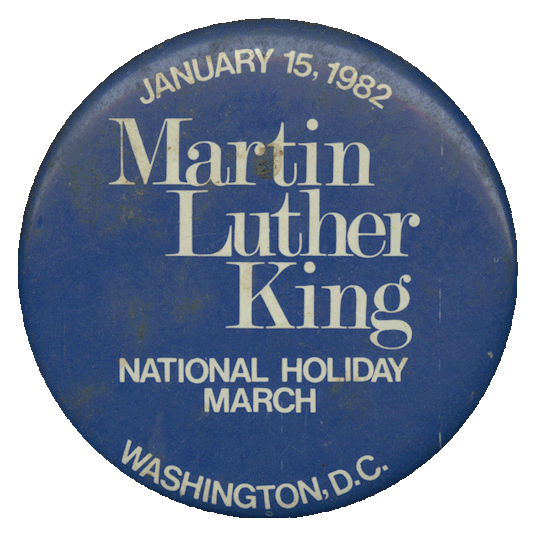
Pinback button promoting Martin Luther King Day 1982. Collection of the Smithsonian National Museum of African American History and Culture
Despite the national fervor inspired by King's death, the bill to create a holiday in his honor languished for years with limited congressional support. However, Democratic Michigan Congressman, John Conyers, who first proposed the bill on April 8, 1968, was not deterred. He continued to reintroduce the legislation every year with the support of the Congressional Black Caucus, which Conyers helped found.
To me, [King] is the outstanding international leader of the 20th century without ever holding office. What he did — I doubt anyone else could have done. — Rep. John Conyers (D-Mich.) January 18, 2015
In 1979, on the 50th anniversary of King’s birth, the bill finally came to a vote in the House. However, even with a petition of 300,000 signatures in support, the backing of President Jimmy Carter, and testimonials from King’s widow, Coretta Scott King, the bill still was rejected by five votes in the House. Republican Missouri Congressman Gene Taylor led the opposition, which cited the costs of an additional federal holiday and traditions which exclude private citizens from receiving recognition with public holidays named in their honor.
Even though it failed to pass in the House, public support for the bill continued to grow, in no small part due to musician Stevie Wonder. The Motown singer and songwriter’s 1980 album “Hotter Than July” featured the song “Happy Birthday,” which served as an ode to King's vision and a rallying cry for recognition of his achievements with a national holiday.
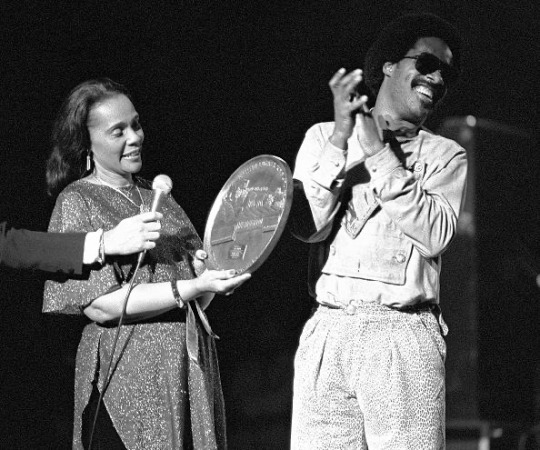
Coretta Scott King and Stevie Wonder during M.L.K Gala at The Atlanta Civic Center in Atlanta Georgia, January 01, 1982. Photo by Rick Diamond/Getty Images
I just never understood / How a man who died for good / Could not have a day that would / Be set aside for his recognition ... in peace, our hearts will sing / Thanks to Martin Luther King — Stevie Wonder. "Happy Birthday" Hotter than July (1980)
Wonder continued to spread his message with regular appearances alongside Coretta Scott King at rallies. He also capped a four-month tour with a benefit concert on the National Mall, where King delivered his famous “I have a Dream” speech 18 years earlier.
When the bill again made it to the house floor in 1983, fifteen years after King’s murder, support was overwhelming. Working together, Coretta Scott King, the Congressional Black Caucus, and Stevie Wonder amassed a six million signature petition in favor of the holiday. The bill easily passed in the House with a vote of 338 to 90. However, when the bill moved onto the Senate, Republican North Carolina Senator, Jesse Helms attempted to dismiss the legislation by submitting documents alleging that the civil rights leader harbored ties to the communist party. Outraged by the personal attack on King's character, Democratic New York Congressman Daniel Patrick Moynihan threw the more than 300 page binder to the ground and stomped on what he described as a "packet of filth." After two days of debate, the bill passed in the Senate and President Ronald Regan reluctantly agreed to sign it into law.
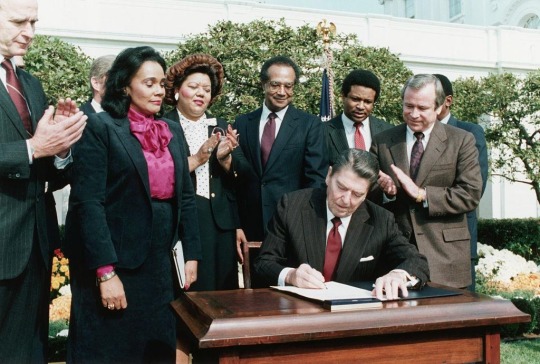
In the presence of Coretta Scott King (2nd from left), President Ronald Reagan signs a bill making Martin Luther King Jr.'s birthday a national holiday. Photo by © CORBIS/Corbis via Getty Images
I would have preferred a non-holiday in King's honor but since they seem bent on making it a national holiday, I believe the symbolism of that day is important enough that I will sign that legislation when it reaches my desk. — President Ronald Regan, October 20, 1983
Despite the holiday’s federal recognition, statewide observance of Martin Luther King Jr. Day is far from uniform. Some states include additional holidays, which are celebrated concurrently with Martin Luther King Jr. Day. Arizona and New Hampshire, for example, celebrate “Civil Rights Day” and Wyoming celebrates “Wyoming Equality Day.” Other states, like Alabama and Mississippi, have combined the King holiday with “Robert E. Lee Day” to honor the birthday of Confederate General Robert E. Lee, who was born on January 19. However, Martin Luther King Day has been recognized in all 50 states since early 2000.
On August 23, 1994, the King Holiday and Service Act was signed into law by President Bill Clinton. Inspired by King’s life of service, Congressman John Lewis and former Senator Harris Wofford proposed the legislation to encourage Americans to find common causes and methods of improving their communities. In honor of Congressman Lewis’ initiative to make the Martin Luther King, Jr. holiday “a day on, not a day off” the National Museum of African American History and Culture has organized donation drives to those in need and partnered with corporations to provide music, film screenings and interactive activities to the public. If you are interested in giving back to your community this year, we encourage you to explore our website for volunteer opportunities or participate in the transcription of the Freedmen’s Bureau papers.**
**The Freedmen's Bureau Records
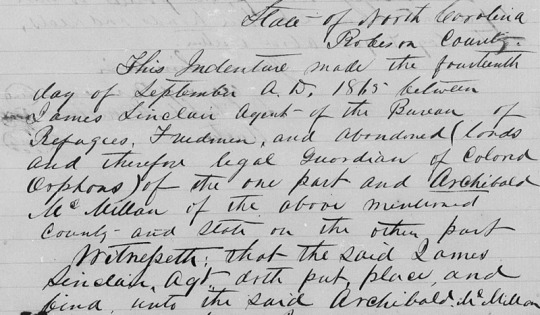
The Museum is focusing attention on the post-Civil War transition of enslaved people to freedom by making the records of the Freedmen’s Bureau accessible online.
The United States Bureau of Refugees, Freedmen, and Abandoned Lands, commonly known as the Freedmen's Bureau, was created by Congress in 1865 to assist in the political and social reconstruction of post-war Southern states and to help formerly enslaved people make the transition from slavery to freedom and citizenship. In the process, the Bureau created millions of records that contain the names of hundreds of thousands of formerly enslaved individuals and Southern white refugees.
Freedmen's Bureau Search Portal
The Freedmen’s Bureau Search Portal provides unprecedented opportunities for family historians and genealogists to search for their ancestors and for scholars to research a variety of topics related to slavery and Reconstruction in the Freedmen’s Bureau records. The portal makes possible for the first time the ability to research multiple sets of Freedmen’s Bureau data in one place, allowing users to search indexed data for specific names, places, and dates and transcribed data for topics, subjects, institutions, and any other words or phrases. Matches to search criteria will be highlighted in the results.
Freedmen’s Bureau Transcription Project
The Museum has collaborated with the Smithsonian Transcription Center to transcribe more than 1.7 million image files from the Freedmen’s Bureau records. The Transcription Center is a platform where digital volunteers can transcribe and review transcriptions of Smithsonian collections. The Freedmen’s Bureau Transcription Project is the largest crowd sourcing initiative ever sponsored by the Smithsonian.
Once completed, the Freedmen’s Bureau Transcription Project will allow full text searches that provide access to both images and transcriptions of the original records. Family historians, genealogists, students, and scholars around the world will have online access to these records. In addition, these transcribed records will be keyword searchable, reducing the effort required to find a person or topic. Transcribing these original documents will increase our understanding of the post-Civil War era and our knowledge of post-Emancipation family life.
History of the Freedmen's Bureau
Congress established the Bureau of Refugees, Freedmen and Abandoned Lands in 1865 to assist in the reconstruction of the South and to aid formerly enslaved individuals transition to freedom and citizenship. Administered by the War Department, the Bureau followed the department’s war-inspired record-keeping system. These handwritten records include letters, labor contracts, lists of food rations issued, indentures of apprenticeship, marriage and hospital registers and census lists. They provide a unique view into the lives of newly freed individuals and the social conditions of the South after the war.
The Bureau was responsible for providing assistance to four million formerly enslaved individuals and hundreds of thousands of impoverished Southern whites. The Bureau provided food, clothing, medical care, and legal representation; promoted education; helped legalize marriages; and assisted African American soldiers and sailors in securing back pay, enlistment bounties, and pensions. In addition, the Bureau promoted a system of labor contracts to replace the slavery system and tried to settle freedmen and women on abandoned or confiscated land. The Bureau was also responsible for protecting freedmen and women from intimidation and assaults by Southern whites. The Bureau set up offices in major cities in the 15 Southern and border states and the District of Columbia. Under-funded by Congress and opposed by President Andrew Johnson, the Bureau only operated between 1865 and 1872.
The Freedmen’s Bureau plays a key role in the Museum’s Slavery and Freedom and Defending Freedom, Defining Freedom: The Era of Segregation, 1877-1968 exhibitions. In these exhibitions, the Freedmen’s Bureau provides a backdrop against which we see African Americans resisting white efforts to deny them “life, liberty and the pursuit of happiness.” The Freedmen’s Bureau records are also featured in an Interactive exhibition in the Robert Frederick Smith Explore Your Family History Center on the Museum’s second floor.
The National Archives and Records Administration preserves the original Freedmen’s Bureau records.

The Bureau helped support schools like this one in New Bern, North Carolina, to educate newly freed children. Collection of the Smithsonian National Museum of African American History and Culture
You’ll find African American genealogists are quite excited about the Freedmen’s Bureau Project. Each Indexed document brings us closer to reclaiming our ancestral heritage and historical past. — Hollis Gentry, Museum Genealogy Specialist

Freedman's Village was located on what is now Arlington National Cemetery, Arlington, VA. Courtesy of Library of Congress, LC-USZ62-117892
Working on the Freedman’s Bureau Project has shed a light on the past for me that I never would’ve otherwise been able to experience. In working with these records, I gained a new understanding about how people lived. I hope the work we’ve done will be valuable for generations to come as people delve into their pasts. — Libby Herndon, Museum Volunteer
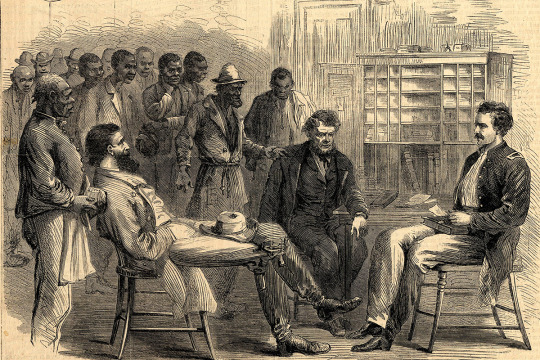
African Americans reported concerns and filed legal claims with agents at the Bureau’s field offices creating millions of handwritten documents. Courtesy of the New York Public Library Digital Collections
5 notes
·
View notes
Text
happy Ronald Reagans death day to all who celebrate!!!
2 notes
·
View notes